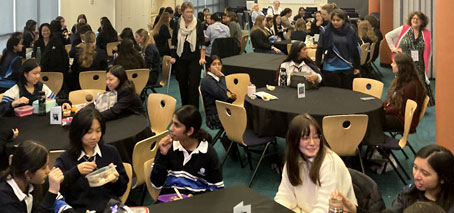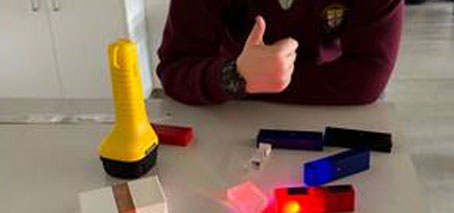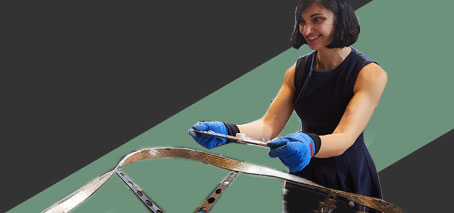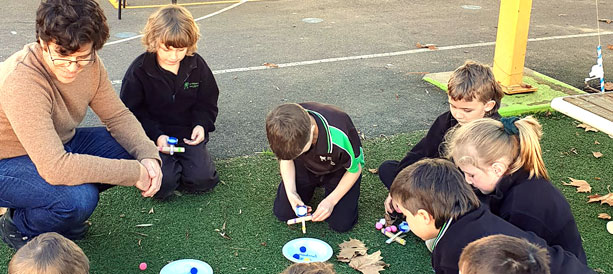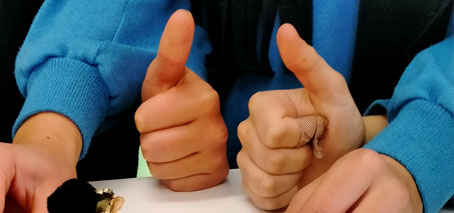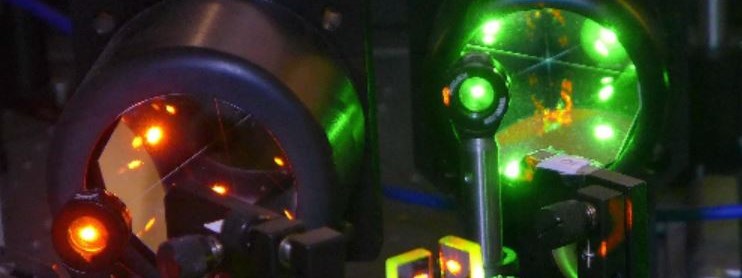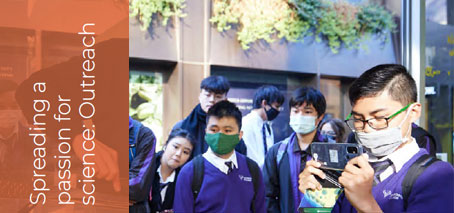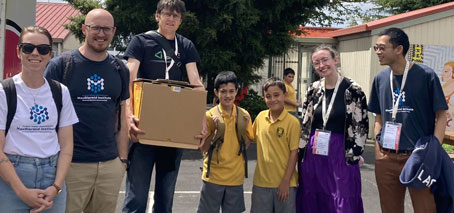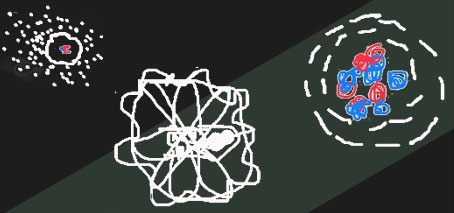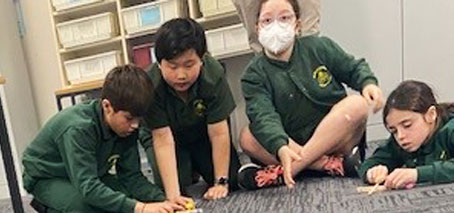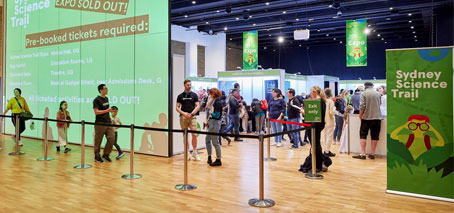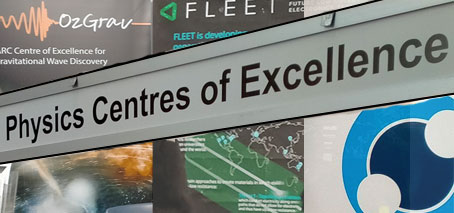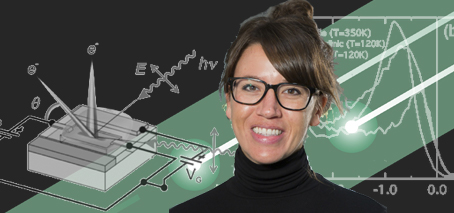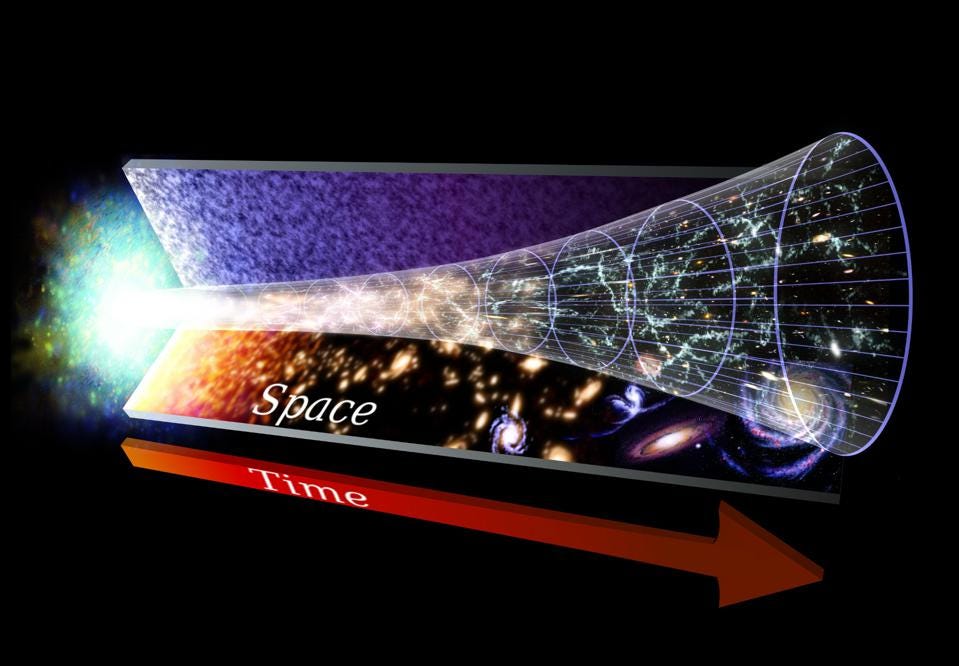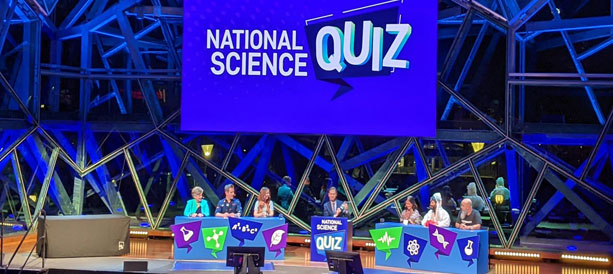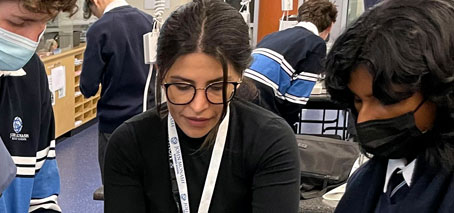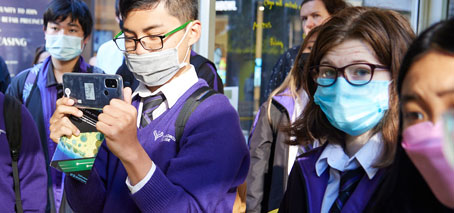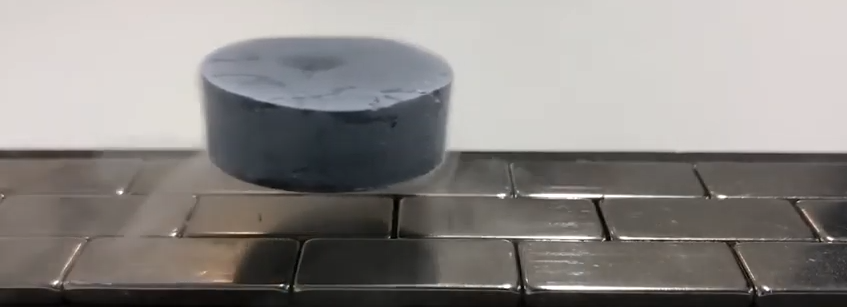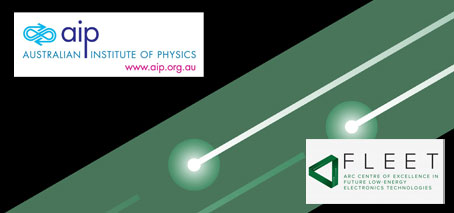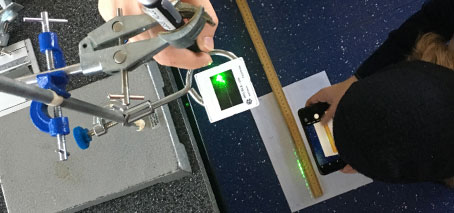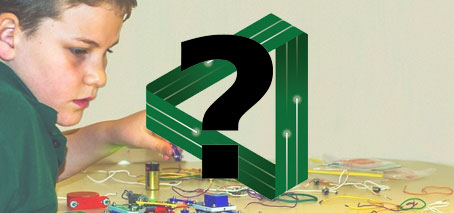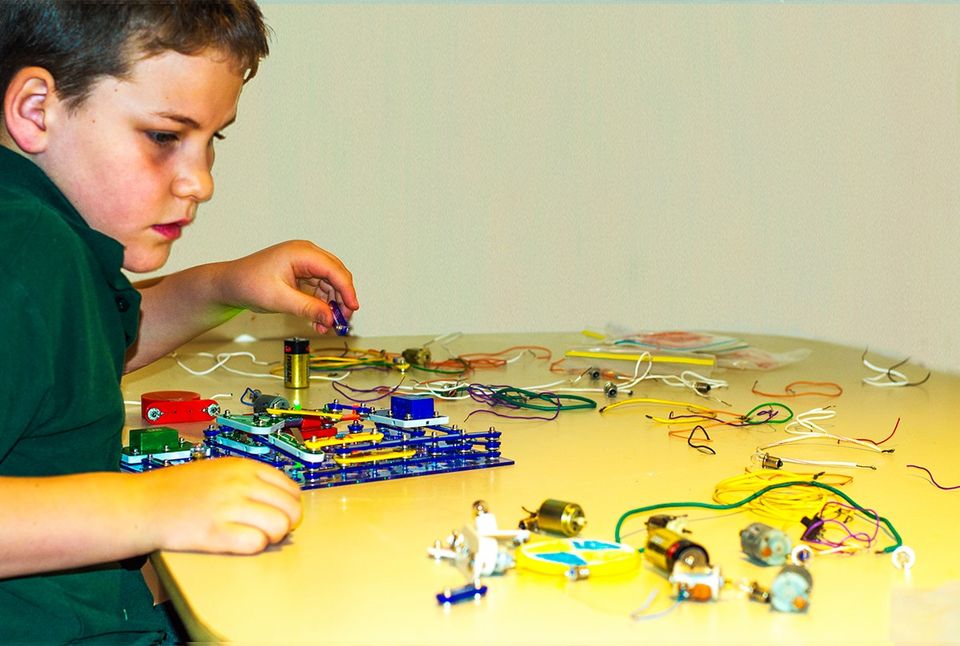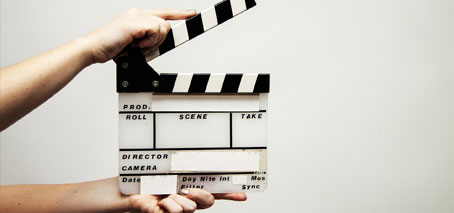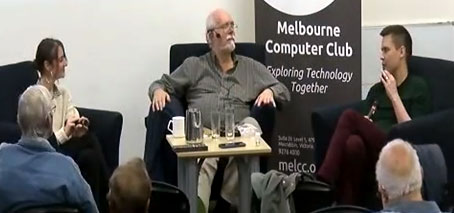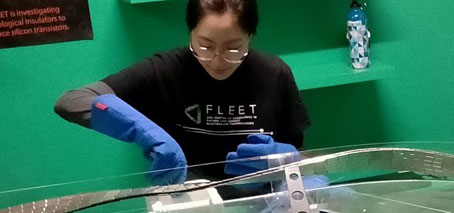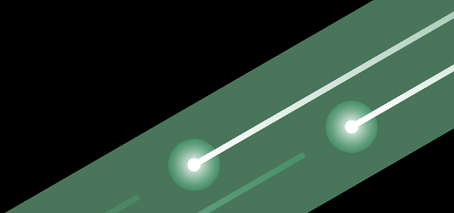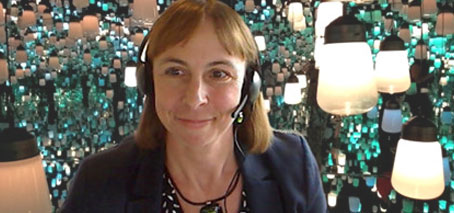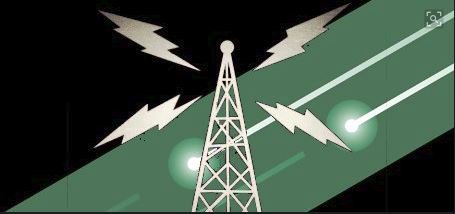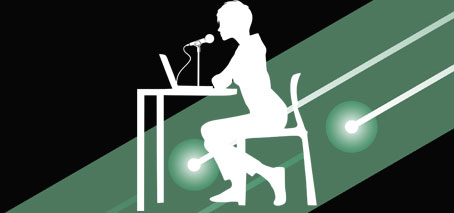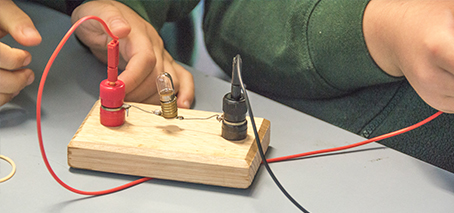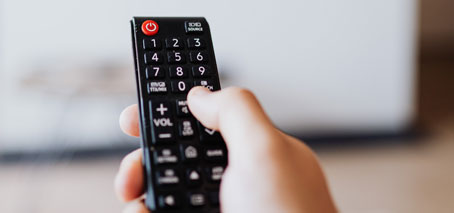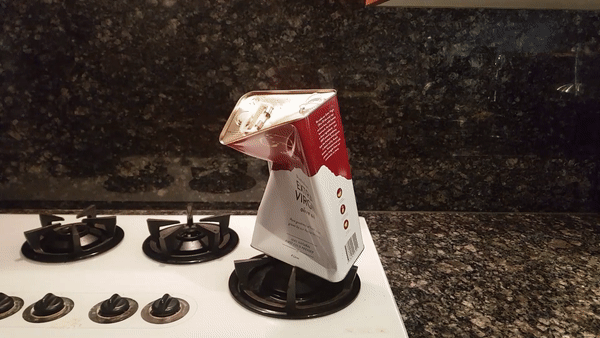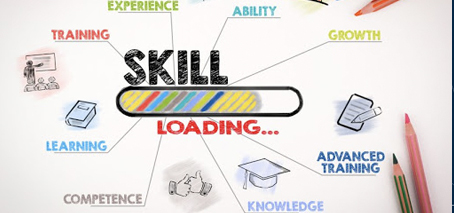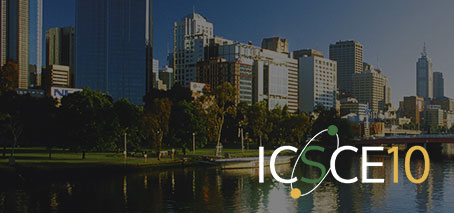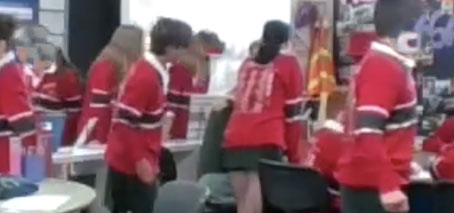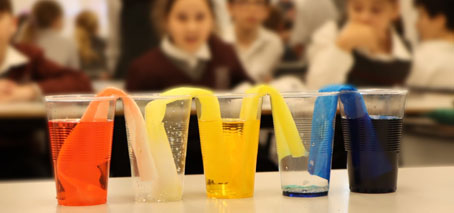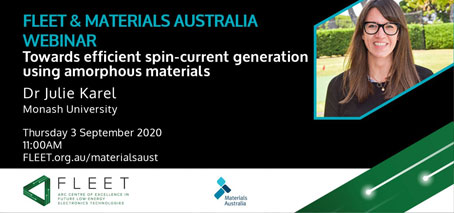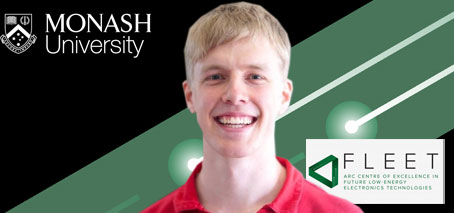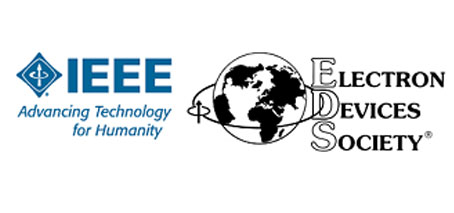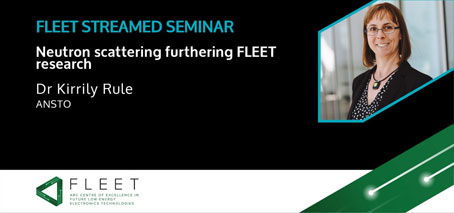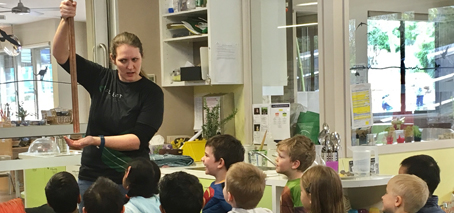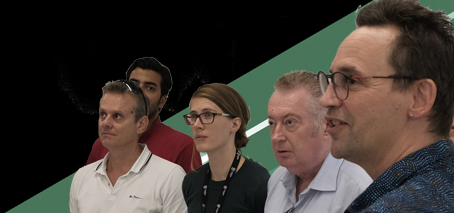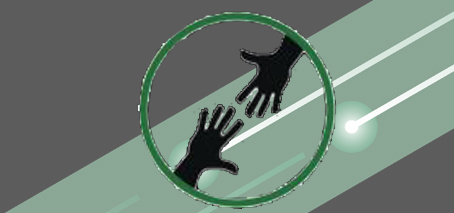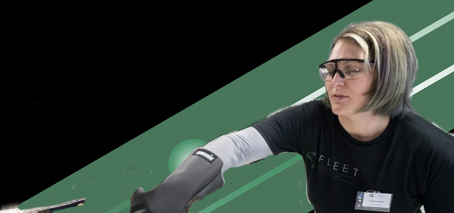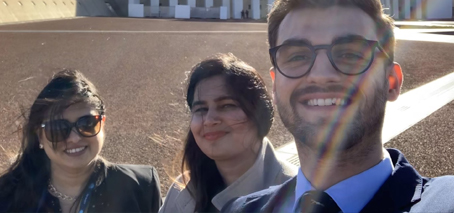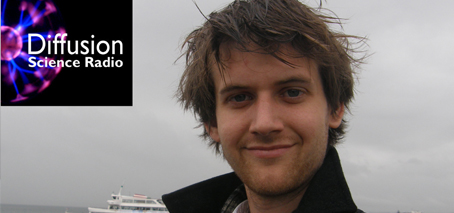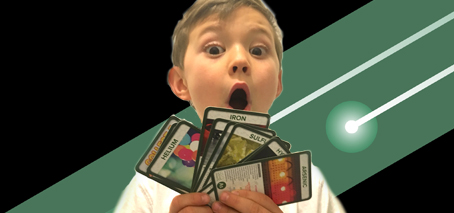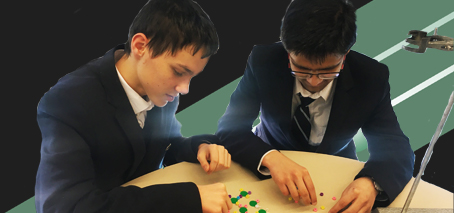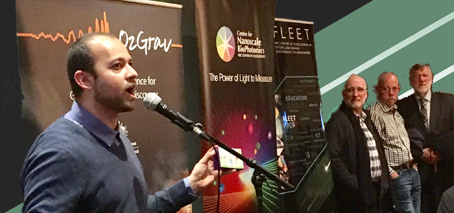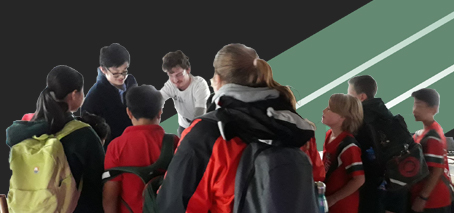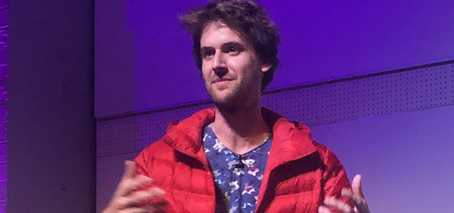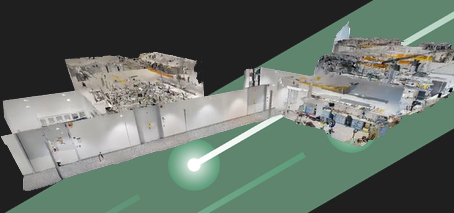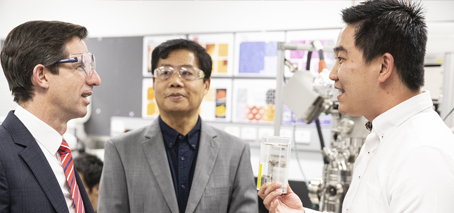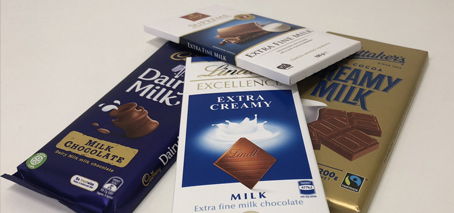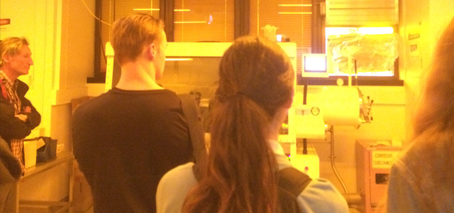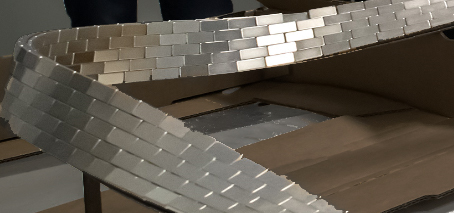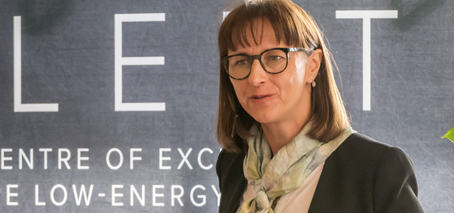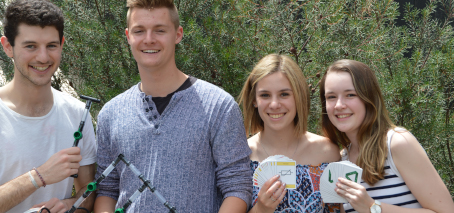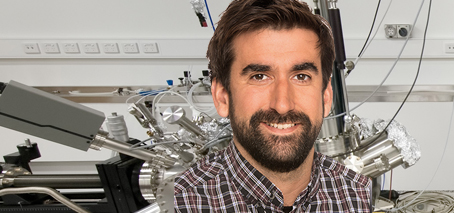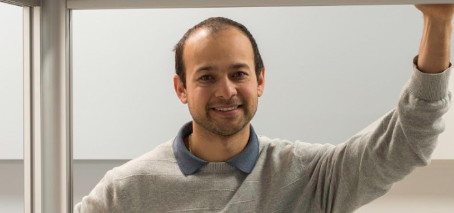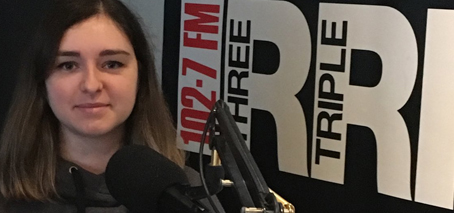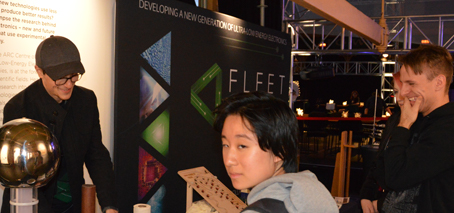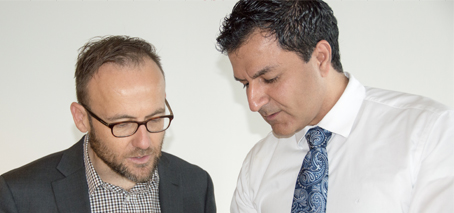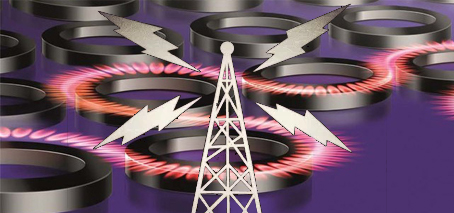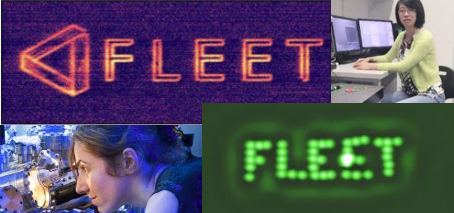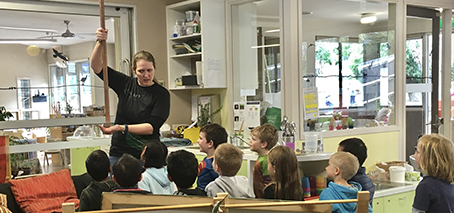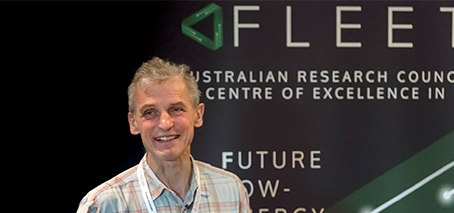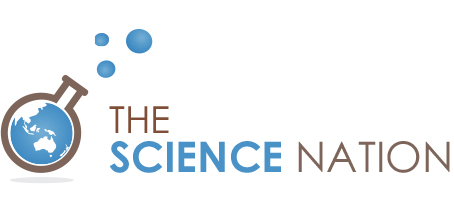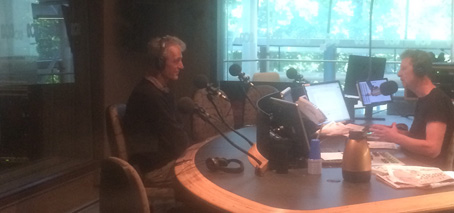FLEET AI Prof Sue Coppersmith (UNSW) kicked off her AIP Woman in Physics national tour this month in Victoria. Sue introduced over 250 students, teachers and public to the life of a theoretical physicist at five events around Melbourne. The busy three day schedule included: A public lecture at RMIT aimed at a physics-savvy public audience. Girls in Physics breakfast …
FLEET outreach impact
Quantum atoms in regional Victoria outreach
FLEET took a road trip to Horsham in regional Victoria to introduce 100 Year 8 and 9 students to quantum physics and the colourful world of light. Year 8 students participated in range of hands-on activities such as the famous ‘Pepper’s Ghost’ visual illusion, and playing with lasers and prisms to understand reflection and refraction. Meanwhile Year 9 students took …
Levitating superconductor and the desire for a socially responsible digital future
The public’s awe of FLEET’s levitating superconductor and engaging dialogue with FLEET at the 2023 Sydney Science Trail enabled a shift in public understanding about how society uses digital technology and a call for a socially responsible digital future. FLEET was one of more than 20 science organisations engaging audiences with interactive exhibits at the Sydney Science Trail Expo, developed …
Getting wavy: New FLEET Schools Forces and Energy resource goes from Newton to Einstein
Learning about ‘wavy’ stuff you can’t see, smell, taste or touch can test students’ intuitive understanding of the world. FLEET’s latest Forces and Energy teacher resource examines energy from the physics of Newton to Einstein, to the wavy behaviour of sub-atomic particles such as electrons. Students learn how energy is crucial to our understanding of how everything in the universe …
Inspiring outreach, with bombs and light circuits
Teaching energy, releasing creativity, and inspiring future scientists FLEET and Monash volunteers used catapults, graphite circuits and diffraction goggles to create challenges for 250 Mater Christi College students competing to win their annual STEM Cup. For the STEM Cup challenge, which is judged on teamwork, innovation and communication, FLEET designed two hands-on workshops that got middle and senior secondary students …
Forces and energy: Quantum energy
Forces and energy: Electricity and sustainable energy
Forces and energy: Kinetic, potential, conservation and transformation
Forces and Energy: Energy and Work
FLEET Schools: Forces and Energy
Spreading a passion for science: Outreach in 2022
FLEET has an extremely ambitious program of STEM outreach and communication, engaging Australians with science – from school children to the public to policymakers FLEET’s outreach activities improve public awareness of FLEET research and scientific literacy among school students. FLEET members get a greater appreciation of their audience’s interests, understanding and values, and learn how to effectively communicate with them. …
Forging outreach relationships and taking nano and quantum to Rotorua schools
FLEET and MacDiarmid Institute members teamed up at the recent AMN10 conference in Rotorua NZ to conduct science outreach workshops for 320 local school students. Over four days, 25 volunteers from FLEET and partner organisation the MacDiarmid Institute visited seven schools and presented a variety of hands-on science workshops to students ranging from year 4 to 9, in a program …
Rural schools’ outreach
In 2022 FLEET extended outreach activities to a number of regional and remote schools. Such schools have limited opportunities to engage with visiting scientists, or to and participate with them in hands-on science workshops. Engagement with working scientists, and hands-on exercises, helps engage students’ curiosity, and exposes them to a greater breadth and depth of career opportunities in STEM and …
Creating a quantum spark in primary students
A FLEET Primary School pilot workshop showed primary students can learn and conceptualize quantum physics and are adept at the Mexican wave. Meanwhile, 155 Hughesdale Primary School students got their first introduction to quantum physics. The year 5 and 6 students explored the quantum atomic model via role-playing activities, applying this to understand how electricity and resistance work at the …
Boom! Watch out below. FLEET take their energy and forces workshop to Hughesdale Primary School
By using and modifying catapults made from icy pole sticks and rubber bands, 270 primary students from Hughesdale Primary school learned about forces and energy and thought critically about FLEET’s research and why we are trying to develop energy efficient electronics. FLEET developed the Forces and energy workshop for Years 4-7 based on pilot workshops run with primary schools in …
Captivating physics and our digital society—Sydney Science Trail
More than 1000 high-school and primary students, and another 1100 members of the public were introduced to FLEET’s research and the counterintuitive world of quantum physics at Sydney Science Trail in July, in FLEET’s largest post-pandemic outreach event to date. FLEET UNSW members were among the 20+ science orgs presenting at Sydney Science Trail, based at Australian Museum as part …
Teaching the teachers at CONASTA
FLEET has joined forces with two other ARC Centres of Excellence, Exciton Science and Ozgrav, at the 2022 Australian Science Teacher Conference (CONASTA) to engage primary and secondary educators about their research and educational resources. FLEET’s Senior Outreach Coordinator Jason Major conducted a professional development workshop at the event that informed and provided primary-early secondary teachers with the confidence to …
Julie Karel recognised for excellence in research and science outreach
Congratulations to FLEET’s Dr Julie Karel (Monash), receiving a Victorian 2022 Young Tall Poppy Science Award, recognising her research in functional amorphous materials for future ultra-low energy electronics, and in science outreach. The Young Tall Poppy awards, an initiative of the Australian Institute of Policy and Science, recognise excellence in research as well as enthusiasm for communicating science beyond the …
Ask the Physicists: Are the dimensions of space constant? Is today’s metre the same as tomorrow’s meter?
National Science Quiz
Over 200 in-person audience members and more than 400 online contestants competed in this month’s National Science Quiz, co-presented by FLEET with a collaboration of nine research organisations. Return host ABC TV and radio presenter Charlie Pickering, who has hosted each NSQ since the inaugural edition in 2017, chaired two competing teams, comprising: Astrophysicist Kirsten Banks (UNSW) Meteorologist Nate Byrne …
FLEET’s engagement with rural schools continues
Following on from FLEET’s previous trip to the western districts in May, Centre outreach coordinator Jason Major and COO Tich-Lam Nguyen visited Horsham College north of the Grampians to engage year 7 students and pilot-test FLEET’s Forces and Energy workshop. The budding scientists (all 170 of them) built catapults and balloon rockets to explore Newton’s 2nd and 3rd laws and …
2D materials workshop skilling up future Australian scientists
Nobel-winning material science in the classroom Gol Akhgar and Julie Karel (Monash) this month demonstrated graphene exfoliation with scotch-tape in the class, explaining the role of 2D materials in future beyond-CMOS electronics. The lesson is part of FLEET’s ongoing year-10 future electronics unit at John Monash Science School, which builds up from atomic/quantum fundamentals to transistor functions, logic circuits and …
Melbourne Knowledge Week 2022
Over the course of Melbourne Knowledge Week last week FLEET volunteers engaged with around 300 visiting members of the public, talking about FLEET’s mission to ensure a sustainable future for computing, with some fun props to demonstrate electromagnetic forces and the role of quantum materials such as superconductors. The bright yellow sustainable computers stall at the new MKW festival hub …
National Science Quiz
FLEET Outreach
Presenting a feast of FLEET science
There will be a feast of FLEET science in show at the Australian Institute of Physics Summer Meeting (this coming week, 6–9 December) at QUT in Brisbane, with parallel online delivery. The summer meeting will see plenary and keynote talks by FLEET’s Michael Fuhrer, Dimi Culcer and Kirrily Rule, with over 30 presentations by Centre members across six universities. FLEET …
Students confirm benefits of FLEET future-computing unit
Surveying and student interviews confirms success of future computing unit in encouraging girls/other students in physics Over the last three years FLEET has helped put ninety Year 10 students through a ‘Future electronics’ unit, in partnership with John Monash Science School (JMSS). As well as covering semiconductors, Moore’s Law and computing, the course introduces quantum physics at an intuitive level …
Ask a physicist
–Are hover boards real? –What’s lightning? –Can we time travel? –Can I predict where a rainbow will form? –What is electricity, and who were the first electricians? Introducing FLEET’s new “Ask a physicist” page, where we’re encouraging schoolkids, parents and others to ask their hardest, most-baffling questions and we’ll answer them (or, we’ll find a FLEET member who can). We’d …
Making metal stuff fly, levitation and the potential of superconductors
FLEET Schools
Video explainers for 3MT
Tackling the next climate crisis with polariton superfluids, chocolate bars, ultra-fast laser pulses and chaotic gardening… FLEET’s Rishabh Mishra (Swinburne), Mitko Oldfield and Alex Nguyen (both at Monash University) have recently recorded explanations of their PhD research, submitted for the 2021 national Three Minute Thesis competition. Mitko Oldfield (School of Physics and Astronomy) explains his studies of polariton superfluids, with …
Engaging with end-users: Meeting the Melbourne Computer Club
What is the future of computing? As Moore’s law is approaching an end, new technologies are required to enable further advances in computational speed and energy-efficient data processing. As transistors took their first baby-steps over half a century ago, the next generation of electronic switches are being born today. Engaging with the Melbourne computing and electronics community in a ‘fireside …
Engaging public conversations at Melbourne Knowledge Week
Melbourne Knowledge Week (26 April-2 May 2021) was an opportunity for FLEET to engage with over 350 members of the public about the exciting future of computing, and the vital role of energy-efficient electronics in that future. FLEET’s sustainable computing booth ran for the full week at the festival hub, with hands-on science demonstrations linked to materials used in FLEET …
Maintaining international links in the absence of international travel
US–Australian transpacific condensed-matter talks The temporary halt in international visits that traditionally spark and fuel research collaborations in 2020 pushed FLEET to find new ways to connect. Some positives have surfaced amid the negative impacts of Covid-19 travel bans on science collaboration, including the expansion in videoconferencing allowing researchers from geographically isolated regions to connect. Together with Centre partners at …
Monthly talks bring Australian research to the physics community
A series of talks spotlights leading Australian physics research for the physics community. Co-organised by FLEET and the Australian Institute of Physics, the series throws the spotlight on a different Australian Research Council Centre of Excellence each month, with AIP members and others in the physics community dialing in over zoom to hear about leading Australian research. To date, over …
FLEET heading to Melbourne Knowledge Week
Melbourne Knowledge Week (26 April-2 May 2021) will be an opportunity for FLEET to engage with the public about the exciting future of computing, and the vital role of energy-efficient electronics in that future. FLEET’s sustainable computing booth will run for the full week at the festival hub, with hands-on science demonstrations linked to materials used in FLEET research, such …
Online format is easy, enjoyable engaging: SMP 2021
This years’ Science Meets Parliament 2021 transitioned to a mostly virtual event and I must admit, I enjoyed this format thoroughly. The format involved shorter sessions scheduled throughout March, which made it much easier to attend amongst other work and family commitments. This extended program was in conjunction with 2 full days of focused sessions with seminars on topics such …
FLEET PhDs on the Melbourne airways
Three FLEET PhD students this month featured on popular radio science show Einstein a go-go, on the show’s regular “20 PhDs in 20 minutes” segment. In this format, student and host each get a minute, covering the student’s entire project in just two minutes combined. (Perfect practice for the famous ‘elevator pitch’.) The three FLEET presenters were Alex Nguyen (Monash), Matt …
2020: a challenging year for outreach!
In 2019, after a remarkable achievement in reaching over 10,000 students, FLEET voluntarily raised its outreach target from 200 students to 2000 students, 50 teachers to 75 teachers and 2000 public members to 5000 public members. And then Covid happened … However, despite the unique challenges that Covid imposed on face-to-face outreach, cancelling public events and banning in-class or in-lab …
Engaging senior school students at JMSS in 2020
In 2020, FLEET continued the Year 10 ‘Future electronics’ course launched the year before in partnership with John Monash Science School (JMSS), Victoria. As well as covering the history of semiconductors, Moore’s Law and computing, the course introduces quantum physics at an intuitive level (with minimal maths) and expands on this fundamental understanding to explain complex, useful quantum states such …
Spotlighting ARC physics in 2020
FLEET pushed out the boundary of online talks, collaborating with the Australian Institute of Physics (AIP) to co-host a series of monthly public seminars highlighting Australian physics research. The new series throws the spotlight on a different Australian Research Council Centre of Excellence each month, with AIP members and others in the physics community joining over Zoom to hear about …
Remote outreach that’s also hands-on
FLEET scientists seeking new, creative ways to do science outreach found a silver lining in Covid-19 restrictions: they actually improved the experience for students. A team of FLEET-UNSW PhDs and early-career researchers (ECRs) was able to bridge 2020’s Covid restrictions to safely engage a classroom of students with virtual, but hands-on science. Led by PhD student Vivasha Govinden and node …
‘Pivoting’ to virtual: online lab tours in 2020
In the absence of in-house lab tours to introduce school students to working labs and researchers, in 2020 FLEET developed and distributed a series of ‘virtual lab tours’, of varying levels of interactivity: Show-and-tell lab tour via webcam for John Monash Science School (JMSS) students at Clayton of FLEET laboratories at UNSW in Sydney (materials science), and Swinburne University in …
Members’ homescience
While FLEET’s face-to-face outreach efforts were necessarily limited in 2020, the Centre innovated new ways to keep our members involved in science outreach. Several FLEET members took advantage of lockdown to generate homescience experiments at home, with a seeming bias towards experiments that involved blowing something up or setting something on fire. (An insight into lockdown frustration perhaps, or just …
Hosting FLEET research seminars in 2020
FLEET turbo-charged our existing Centre-wide seminar series in 2020, with 10 research seminars – a significant increase from only four seminars in 2019. Very aware of the importance of Centre cohesion without inter-state travel and with many universities in lockdown, FLEET threw extra resources into monthly Zoom seminars, often overlapping with expanded ‘journal club’ meetings involving multiple interstate visitors. Two …
Hosting scientific meetings in 2020 (ICSCE10)
In January 2020 FLEET brought the 10th International Conference on Spontaneous Coherence in Excitonic Systems (ICSCE10) to Australia for the first time. Continuing this 15-year tradition from the global scientific community interested in various quantum phenomena, ICSCE10 was hosted at the Arts Centre Melbourne amidst smoke storms resulting from one of the worst bushfire seasons in Australia’s history. ICSCE10 brought …
Remote science-outreach ‘wow’s students
Distance and Covid will not stop science-outreach. Thank you Zoom!** **not a paid partnership : ) Students at Elsternwick Primary School in Victoria had the opportunity to learn about electrical power, in a hands-on exercise guided by on-screen FLEET members, and following two of the experiments from FLEET’s comprehensive Home Science library. “A unanimous ‘WOW!’ came from all four classrooms …
Engaging science-outreach in the times of COVID
Scientists finding creative ways to do science-outreach found a silver lining in COVID restrictions actually improved the experience for students, and took the scientists back to remember ignition of their own childhood ‘science spark’. A team of FLEET PhDs and ECRs at UNSW were able to bridge 2020’s COVID restrictions to safely engage a classroom of students with virtual, but …
UNSW outreach videos from the lab
It’s certainly been a challenge, maintaining science-outreach efforts in 2020… But a group of a FLEET researchers found a way to showcase their labs at UNSW recently, spotlighting the facilities for prospective students at the university’s virtual open day. Introduction to the undergrad physics labs (Krittika Kumar, Matt Rendell, Yoni Ashlea-Alava and Karina Hudson) Measuring superconducting quantum interference: a third-year …
Julie Karel describing search for future memory, for Materials Australia
An online audience of almost 90 tuned in this week to hear FLEET CI Dr Julie Karel describing her search for non-volatile memory technologies and associated materials challenges. The talk was co-hosted by FLEET and Materials Australia. Catch up on the talk here Julie described her own work at Monash Department of Material Science and Engineering developing materials that can …
Matt Gebert: outreach champion
Congratulations to FLEET PhD student Matt Gebert, recognised for his dedication to science-outreach by the Monash Faculty of Science. Matt’s contributions to science outreach include running lab tours with Monash Tech School, demonstrating levitating superconductors and speaking at Monash University open day, teaching regional students via the Emerging Science Victoria program, coordinating PhD day, and in-class demos and talks, including …
Behind the scenes at Monash
Shooting for an all-online open day featuring FLEET’s material labs at Monash University’s New Horizons building, FLEET Research Fellow Dr Semonti Bhattacharyya with School of Physics and Astronomy Steve Morton. See the resulting video on Monash Physics youtube.
What comes after CMOS? An expert discussion
A panel of experts featuring Dr Paolo Gargini (formerly Intel, head of several international semiconductor roadmaps), Prof Michelle Simmons (UNSW, Director. ARC Centre for Quantum Computation and Communication Technology) and Prof Michael Fuhrer (Monash Uni., Director of ARC Centre of Excellence in Future Low Energy Electronics Technologies.) and a guided discussion about the future of electronics beyond CMOS and the role semiconductors and other materials …
Kirrily Rule live-streamed neutron-scattering talk to the AIP
FLEET Partner Investigator Kirrily Rule (ANSTO) introduced an audience of over 100 to the use of neutron scattering in material analysis last week, in a live-streamed seminar co-hosted with the Australian Institute of Physics. Neutron scattering is a powerful tool for investigating the structure and dynamics of condensed matter systems. In particular the magnetic spin of the neutron can interact …
Engaging Australian public and school students with emerging physics
Australian, public-funded physics centres share a responsibility to engage the Australian community with physics, with the aim of: Increasing the participation of students in science and physics Increasing understanding of and passion for science in the general public Improving the outreach skills of early-career (and senior!) physicists. For example at FLEET (the ARC Centre of Excellence in Future Low-Energy Electronics …
Hosting Materials Australia at UNSW
—by Cecilia Bloise, Node Coordinator, UNSW Materials Australia members were hosted on a tour of FLEET’s labs at UNSW in February. FLEET is an ARC Centre of Excellence researching novel materials for ultra-low energy electronics. FLEET represents over a hundred physicists and materials scientists working to develop a new generation of electronics to address the challenge of energy used in information …
Spreading a passion for science: FLEET’s outreach efforts in 2019
FLEET focuses significant efforts on science outreach, with the aim of: Increasing the participation of students in science and physics Increasing understanding of and passion for science in the general public Improving the outreach skills of FLEET members Supporting the public discussion of FLEET-specific science. FLEET shares the responsibility to increase the participation of students in science, and to increase …
Extending FLEET’s engagement with school students
In 2019, FLEET cemented its relationship with Monash Tech School continuing to be involved as the school ramped up its activity. FLEET’s fruitful partnership with Monash Tech School features lab tours that provide hands-on science experiences for participating secondary students. From May to December, FLEET provided lab tours and activities on an almost weekly basis for Year 8 students from …
Collaborating 2019
FLEET continues to build links with other science organisations within Australia to further the reach of science, advance equity issues and develop future leaders, for example: Sponsoring childcare at the annual Science Meets Parliament, with Science and Technology Australia (STA) Running pitch training with two other ARC Centres of Excellence Co-sponsoring Physics in the Pub with three ARC Centres of …
Three of FLEET’s future science leaders engaging with policy-makers
FLEET had a team of three researchers at Science meets Parliament (SMP) in November, talking to parliamentarians and other scientists from around the country, and perfecting the art of pitching to politicians. FLEET’s gun team were: Hareem Khan (RMIT), Oliver Stockdale (UQ) and Semonti Bhattacharyya (Monash). Science Meets Parliament is an annual meeting of Australia’s policy-makers with leading and emerging …
Discussing future science with future scientists (Queensland)
FLEET’s Matt Davis (node leader University of Queensland) discussed the future of science with some of Australia’s future scientists this month at Ipswich State High School, with local MP Shayne Neumann and James Rasmussen of Origin Energy.
Future electronics and theoretical physics: Sam Bladwell interviewed
FLEET’s Sam Bladwell (UNSW) was recently interviewed by Ian Woolf on Diffusion Radio, discussing the ICT energy issue that drives FLEET’s research as well as his own theoretical studies into spin. Listen to: Future low-energy electronics Battling jetlag, Sam describes spintronics and the need for low-energy electronics (from 6:35min) Spins and valleys Sam describes how his theoretical studies dovetail with …
FLEET/UNSW scientists sharing their passion for science: Science outreach in August
—by Cecilia Bloise, Node Coordinator, UNSW There’s nothing like a strong dosage of outreach to get the ‘cats out of the box’ into the public sphere. The FLEET Centre of Excellence invests significant resources into science-outreach, aimed to inspire stronger engagement with science across all levels of the community, from primary and secondary school students to the broader population. Beyond …
Introducing future electronics at secondary-school level
FLEET is currently helping to run a Year 10 ‘Future electronics’ course in partnership with John Monash Science School, Victoria. As well as covering the history of semiconductors and computing, and introducing students to Moore’s Law, the course will also be most students’ first introduction to quantum science, and will be Australia’s first introduction to superfluids and topological materials at …
Congratulations: Dianne Ruka, exceptional service award
Congratulations to FLEET’s outreach officer Dr Dianne Ruka, winning the Award for Exceptional Service to the Faculty of Science at Monash University. Dianne leads the education and training missions for FLEET across all seven collaborating universities, supporting staff and students across both Monash’s Science and Engineering Faculties, through science outreach programs. Since joining FLEET in 2017, Dianne has combined her …
COEs partner up for pitch training and physics on-stage
Three events last week allowed FLEET members to develop valuable, transferable communications and outreach skills, as well as providing a chance for FLEET to strengthen links with other ARC Centres of Excellence. A pitch training session for researchers from three ARC Centres introduced key communications concepts such as choosing the most effective lead, tailoring the pitch to the audience, presenting …
Flying the future-computing flag at Melbourne Knowledge Week
Over a dozen FLEET researchers flew the flag for FLEET and future computing at the recent Melbourne Knowledge Week showcase. Reps introduced the public to ICT energy use, electromagnetism, superconductivity (via FLEET’s supercooled Mobius track) , and the mechanics of binary operations that underlie all modern computing, via the Centre’s two Digicomputers. The superconducting track and Mobius track proved the …
Topological physics finds Famelab success
Congratulations to FLEET’s Sam Bladwell (right, UNSW), who won the NSW semifinal of Famelab, talking about study of electron spin, and will now compete in the finals in Perth on May 8th. Topological physics has done particularly well in this year’s Famelab, with FLEET associates Dr Semonti Bhattacharyya and Dr Antonija Grubisic-Cabo (Monash University) also qualifying for the Victorian semifinals. …
Live-streamed FLEET seminars
In 2018 FLEET began a series of live-streamed seminars to help share research results across the Centre, keep members informed on latest FLEET research, and enhance inter-node collaboration. Early-career researchers presenting the seminars gain valuable presentation experience, and benefit from feedback on their research from diverse Centre members. These seminars also provide an opportunity for regular get-togethers in each node, …
Schools outreach in 2018
Over the course of 2018, 16 FLEET members visited or hosted 22 schools, engaging students with relevant issues such as information and technology (ICT) energy use, how transistors work and the new fields of science studied at FLEET. Our visiting scientists were kitted out with an outreach toolkit developed in-house, including mechanical digicomputers to demonstrate binary operations, two-dimensional (2D) material …
Engaging with policymakers in 2018
Education Minister Simon Birmingham and ARC CEO Sue Thomas visited FLEET labs in may this year at the University of Wollongong’s (UOW’s) Innovation Campus. UOW node leader Prof Xiaolin Wang, Centre Deputy Director Prof Alex Hamilton (UNSW) and UOW researchers gave the Minister a quick introduction to ICT energy-use issues, topological insulators and atomically-thin materials, including a tour of labs …
Topological insulators are like a block of chocolates
Electrically, topological insulators resemble a chocolate block wrapped in foil: electrically insulating on the inside (the chocolate), but electrically conductive around the edges (the foil). It’s a very useful analogy to describe a new type of material, but we decided to test whether it’s actually correct. We tested four bars of chocolate, measuring the electrical resistance of the surrounding foil, …
Physicists tour FLEET-RMIT
FLEET’s RMIT labs recently hosted a tour by members of the Victorian branch of the Australian Institute of Physics, the country’s leading body for physics advocacy and support. The tour included the experimental laboratories and a briefing by RMIT node leader Prof Lan Wang, and AI Torben Daeneke, covering the research topics in Lan Wang’s group, Jared Cole’s group, JianZhen …
Supercool, superconducting Mobius track helps communicate FLEET science
A super-cooled, superconducting Mobius-track impresses the crowds, helps embed FLEET science As a cool science demo, FLEET’s superconductor Mobius track ticks all the boxes: liquid nitrogen – tick. Superconductor – tick. Cool shape – tick. Relevance to the science – tick tick tick. The track features 1500 neodymium magnets, fixed into the shape of a Mobius strip, so that a …
Launching low energy electronics: FLEET Launch 12 June
Our insatiable appetite for computing means ITC already consumes 5–8% of global electricity, and is doubling each decade. Unless that ever-growing demand for computing can continue to be met with efficiency gains, the information revolution will slow down from power hunger. At the launch of a new Australian Research Council Centre of Excellence the audience heard that efficiency gains in current, …
Macro-chips and electronic card games: challenging students
Fresh minds develop hands-on learning methods for schools FLEET is developing innovative ways to communicate physics to school students. A collaboration with Monash University Science allowed the Centre to enlist fresh brains to this communications challenge. A team of maths and physics students from Monash Bachelor of Science–Global Challenges took on the task of developing hands-on games and resources to demonstrate …
Agustin describes atomic-scale materials engineering on RRR
FLEET Chief Investigator Agustin Schiffrin spoke on science show Einstein a Go-Go about experimental physics at the atomic scale, and the study of exciting new nanomaterials with tailored electronic properties. Listen Agustin researches new nanomaterials with novel and exotic electronic properties, constructed of organic (carbon-based) molecules, sometimes inspired by bio-organisms. The team studies topological materials, which display a range of fascinating, …
Sharing a passion for science: outreach to schools
FLEET shares the responsibility to support students and teachers to increase participation in science, and in particular works towards increasing the number of girls and women participating in physics, chemistry and engineering. The Centre Launch on 12 June will showcase FLEET’s science outreach programs, educating the public and inspiring a new generation of scientists. Home Science and FLEET Geeks programs …
Carlos talks ultra-cold atoms and inspiring schoolkids to do science, RRR
FLEET postdoc Dr Carlos Kuhn described his field of ultra-cold atomic science and the fundamental discoveries made in an interview with RRR science show Einstein a Go-Go. The research will take a huge step forward this year with the commissioning of a new ARC-funded quantum-gas microscope, which will bridge the microscopic (atomic) and macroscopic (visible) worlds. Carlos also described his …
Rebecca Orrell-Trigg (RMIT) interview re liquid metal and 2D materials, RRR
FLEET PhD student Rebecca Orrell-Trigg (RMIT) uses liquid metals to synthesise 2D (atomically thin) materials for use in future ultra-low energy electronic devices. Late last year they developed a liquid metal “bubbling” method that was described as “ground breaking”, and have since refined this method to make it even more widely applicable. Rebecca’s interview covered the advantages of the new …
Building members’ outreach skills: 2018 Melbourne Knowledge Week
Melbourne Knowledge Week (May 2018) was an opportunity for FLEET to engage with the public and road-test a number of outreach demonstrations being developed for schools. It also gave 20 Centre members the opportunity to gain valuable experience in public science outreach, speaking to a diverse audience. Melbourne Knowledge Week showcases cool science and engineering projects in the city of …
Melbourne MP Adam Bandt visiting FLEET RMIT
An MP visit last week provided an opportunity to discuss future electronics, 2D materials and science policy. Melbourne MP and Greens Science/Energy spokesperson Adam Bandt was visiting FLEET’s labs at RMIT, hosted by FLEET RMIT node leader Kourosh Kalantar-Zadeh, and FLEET Director Michael Fuhrer. As well as FLEET researchers, Adam also got to meet our scientific counterparts from the Centre for …
Torben talks liquid metal with Subatomic, Radio Adelaide
“It’s so simple my retired parents could do this in their kitchen.” FLEET AI Torben Daeneke discussed deceptively-simple methods of depositing atomically-thin materials with Rohan Neagle, on Radio Adelaide’s Subatomic radio show. Torben’s interview also covered why 2D materials are key to ultra-low energy electronics, the mechanics of 2D deposition, the end of Moore’s Law and the massive amount of …
Micro branding: creating microscale and nanoscale FLEET banners
FLEET researchers taking an innovative, even ‘playful’, approach to their science have created a couple of unique and interesting branding displays for the Centre. >>>FLEET PhD student Fan Ji developed this micro-sized logo (right) at UNSW. The FLEET logo is etched onto the two-dimensional interface between two materials, in letters only a few thousandths of a millimetre high, using bias-assisted …
Michael Fuhrer talks more-accessible physics and better transistors on radio 2CC
FLEET Director Michael Fuhrer spoke Friday with ABC Radio 2CC Canberra’s Rod Henshaw about making physics more accessible, and FLEET’s search for better, ultra-low-energy transistors. Listen Prof Fuhrer was in Canberra for the International Physics Summer School on Topological Matter at ANU. Fuhrer discussed energy use in information and communications technology (ICT) and the alternatives that FLEET is pursuing, …
Launching FLEET Geeks: taking science to schools
Reaching schoolkids, and setting scientists up for outreach success Bringing practising scientists to schools brings enormous benefits. The FLEET Geeks program sees FLEET members performing science shows at primary schools and kindergartens, demonstrating physics with equipment not typically available to students. The program brings scientists to the students, allowing them to ask questions about scientific phenomena seen in the show, …
Ultracold science and benefits of a changeable career in science: Wolfgang Ketterle
Physics experiments at temperatures a billionth of outer space, and the benefits of flexibility in a science career. Nobel physics laureate Prof Wolfgang Ketterle told a crowd of around 200 at Swinburne University of Technology last week about Bose-Einstein condensates (BECs), and other strange states of matter that exist at nano-Kelvin temperatures, which open a new door to the quantum …
Science Says! and other outreach collaborations
FLEET supported the first Melbourne show of Science Says!, a science entertainment event run by The Science Nation, with FLEET’s A/Prof Meera Parish (Monash University) and Prof Chris Vale (Swinburne University of Technology) appearing on the panel at the Royal Society of Victoria. FLEET collaborated with Swinburne University of Technology, Monash University School of Physics and Astronomy, and the Australian …
Wolfgang Ketterle introduces Red to new states: ABC Radio Melbourne
“That’s not right!” Well, yes, it is. Prof Wolfgang Ketterle, in Australia with FLEET, teaches ABC Radio Melbourne’s Red Symons a thing or two about states of matter. In particular, Bose Einstein condensates. Listen below. Ketterle, in town for FLEET’s inaugural annual workshop in Torquay, is visiting the ultra-cold atomic labs at Swinburne today, where FLEET researchers use Bose-Einstein condensates …
- Page 1 of 2
- 1
- 2

